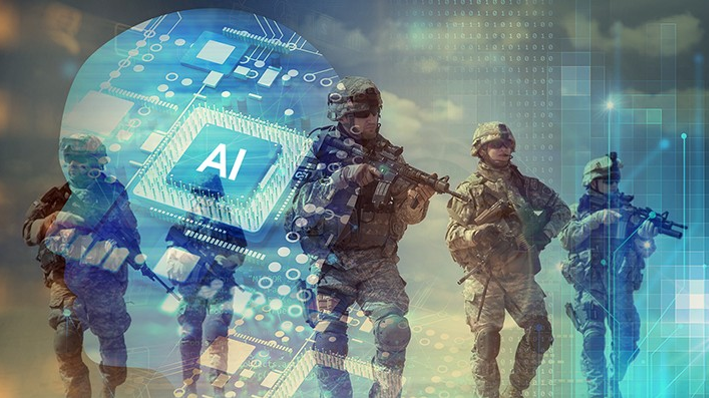The advent of AI-powered satellite reconnaissance has brought a paradigm shift in the field of aerial surveillance. Today, it plays a fundamental role in enhancing data collection, analysis, and interpretation. As technology advances, the potential of combining artificial intelligence with satellite systems becomes limitless. Let’s delve deeper into how this remarkable integration is revolutionizing the surveillance landscape.

What is AI-powered Satellite Reconnaissance?
AI-powered satellite reconnaissance refers to the use of artificial intelligence to enhance the capabilities of satellites in collecting and analyzing data. By automating processes, AI enables satellites to perform tasks such as image recognition, change detection, and predictive analytics with greater accuracy and efficiency.
The Historical Evolution of Satellite Reconnaissance
Satellite reconnaissance has undergone significant evolution since its inception. Initially, it relied on straightforward image capture techniques. However, with technological advancements, the introduction of AI has significantly improved its functionality.
The Early Days
In the early days, satellite reconnaissance relied on rudimentary imaging technology. Satellites transmitted images to ground stations where human analysts would interpret the data manually. This was a time-consuming and often error-prone process.
Technological Integration
With the integration of AI, modern satellites can now autonomously identify objects and changes in landscapes. This technological synergy enhances accuracy and allows for real-time data analysis, which is immensely beneficial for various applications.
Benefits of AI-powered Satellite Reconnaissance
Employing AI in satellite reconnaissance offers a multitude of benefits:
Increased Efficiency
Using AI algorithms to process satellite data reduces the time required for analysis. These algorithms can rapidly identify relevant information, allowing for prompt decision-making in critical situations.
Improved Accuracy
With machine learning capabilities, AI can analyze vast datasets to detect patterns and anomalies with high precision. This accuracy is instrumental in applications ranging from weather forecasting to military surveillance.
Cost-effectiveness
Automation reduces the need for human intervention, thereby lowering operational costs. Organizations can allocate resources to other strategic areas, enhancing overall efficiency.
Applications of AI-powered Satellite Reconnaissance
The applications of AI-powered satellite reconnaissance are diverse and impactful:
Environmental Monitoring
Satellites equipped with AI can monitor environmental changes such as deforestation, ice cap melting, and ocean pollution with unprecedented precision. Accurate data allows policymakers to develop effective environmental strategies.
Military Surveillance
AI-enhanced reconnaissance provides military forces with real-time intelligence, aiding in threat detection and mission planning. By analyzing terrain and tracking movement, AI enables strategic decision-making.
Urban Development
AI-powered satellites play a crucial role in urban planning by providing data on infrastructure development, population growth, and resource management. This data-driven approach facilitates better urban planning decisions.
Key Technologies Driving AI-powered Satellite Reconnaissance
Several technologies drive the effectiveness of AI in satellite reconnaissance:
Machine Learning
Machine learning algorithms help satellites interpret massive amounts of data swiftly. These algorithms learn from previous data and continuously improve their performance.
Computer Vision
Computer vision enables satellites to recognize and categorize objects in images. This advanced technology is pivotal in applications requiring precise image analysis.
Big Data Analytics
The sheer volume of data collected by satellites necessitates robust data analytics capabilities. AI-driven big data analytics assist in extracting valuable insights from complex datasets.
Challenges and Considerations
Despite its myriad advantages, AI-powered satellite reconnaissance does face certain challenges:
Data Privacy Concerns
With increased surveillance capabilities, concerns about data privacy have emerged. Measures must be in place to ensure ethical data usage and protect individuals’ privacy.
Technical Limitations
While AI has remarkable capabilities, it is not without limitations. Technical glitches and system malfunctions can impact the reliability of AI tools.
Ethical Implications
The dual-use nature of AI technologies raises ethical concerns, particularly in military applications. Establishing ethical guidelines and international treaties is crucial to govern its use.
The Future of AI-powered Satellite Reconnaissance
The future of AI-powered satellite reconnaissance is promising. As AI technologies become more advanced, satellite capabilities will continue to expand.
Integration with 5G Networks
The integration of 5G technology with AI-powered satellites will enable faster data transmission and enhance real-time analytics capabilities.
AI in Space Exploration
AI’s role in space exploration is rapidly growing. Future missions to Mars and beyond will benefit from AI’s ability to autonomously analyze data and assist in navigation and exploration.
Global Collaboration
International collaboration in AI and satellite technology will foster innovation. Sharing resources and knowledge will accelerate advancements and address global challenges collaboratively. To delve deeper into how AI is integrated into similar systems, you can explore detailed insights on AI model training best practices. Additionally, read about ensuring AI safety in autonomous systems for a broader understanding of AI implementation.
Conclusion
In conclusion, AI-powered satellite reconnaissance is transforming the landscape of aerial surveillance. It enhances accuracy, efficiency, and decision-making across various domains. Embracing these technological advancements responsibly can unlock potential solutions to global challenges. As we look towards the future, the synergy between AI and satellite technology promises to lead us into a new era of innovation and exploration. For more on ethical considerations and implementation practices of AI, you can read about responsible AI measures supported globally.

FAQs on AI-powered Satellite Reconnaissance
What is the role of AI in satellite recon?
AI plays a crucial role by enhancing data analysis through machine learning and automation, increasing the efficiency and accuracy of satellite reconnaissance.
Can AI-powered satellites invade privacy?
While AI-powered satellites improve surveillance capabilities, ethical guidelines are necessary to ensure they do not infringe on personal privacy rights.
How does AI in satellites benefit environmental monitoring?
AI enables precise data interpretation for monitoring environmental changes, allowing for proactive measures to address ecological issues effectively.

